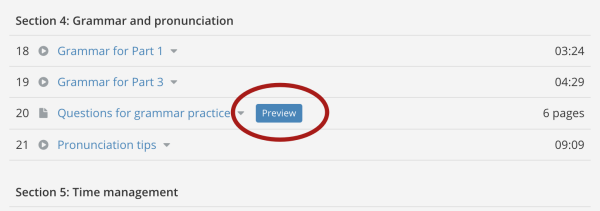One of the main differences between a Band 7+ candidate and a lower-level candidate is the ability to use a range of grammatical structures. Lower-level candidates tend to repeat the same simple tenses all the time (e.g. present simple, present continuous, will + infinitive) and they often use them incorrectly.
If your target band is Band 7 or higher, it is important to listen to the questions carefully and be prepared to use different structures in your answers.
If you want to improve your grammar for the test, it helps to become familiar with the different kinds of ‘grammatical’ questions and know how to answer them, for example:
| Type of question | Key grammar structures to use |
|---|---|
| Question about a recent change | present perfect (have/has + past participle) |
| 'How often?' question | adverbs/phrases of frequency |
| Hypothetical question | would + infinitive / second conditional |
| Comparing two things | comparative structures |
Watch this extract from a sample IELTS Speaking test. At 01:10, the examiner asks the candidate “Has your hometown changed much in recent years?” (question about a recent change) and the candidate replies in the present perfect:
If you want to see more examples of the different questions you might hear and a few tips on how to answer them in a grammatically-correct way, there is a list available to download in the IELTS Speaking Masterclass course. If you have not taken the course yet, you can get the list for free. Click the link below, scroll down to Lecture 20 and press the preview button:
Go to the course and get the questions

This FREE eBook Shows You What Kinds of Tasks and Questions to Expect in the IELTS Speaking Test.


Leave a Reply